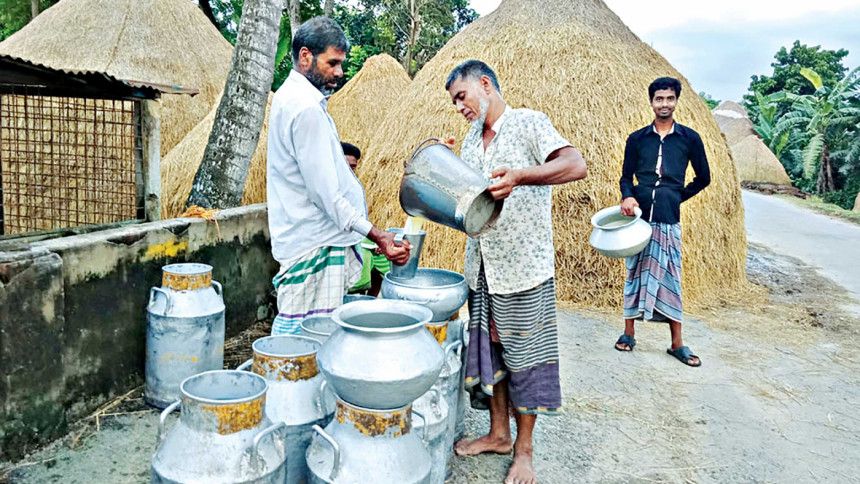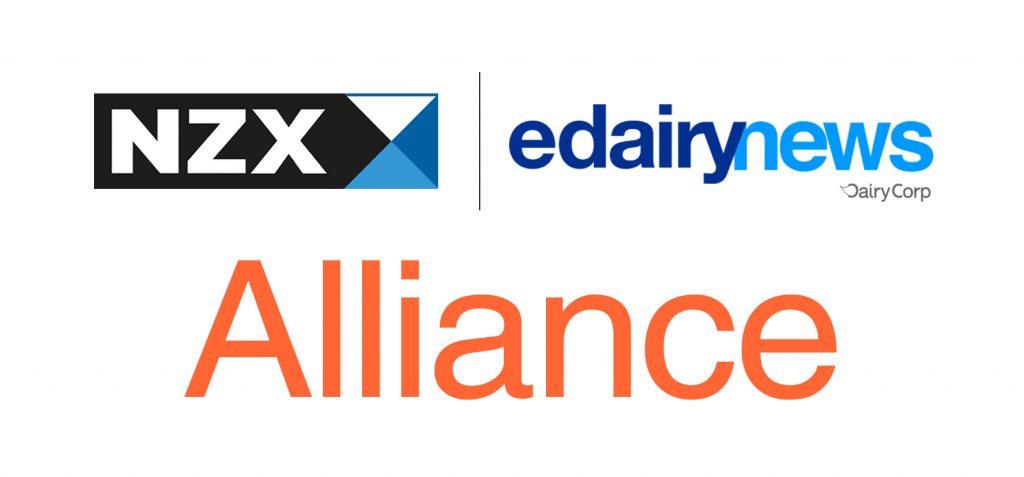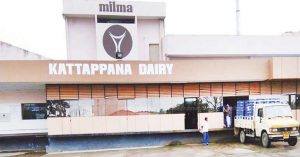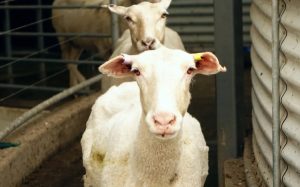This has led to milk collection reaching a record low and a drastic fall in production of Bangladesh Milk Producers’ Co-operative Union Ltd over the last couple of months.
Established in 1973, Milk Vita’s primary objective is to provide a guaranteed market to ensure fair prices for the poor, landless and marginal dairy farmers of rural Bangladesh.
This also benefits citizens who are provided a regular supply of fresh and hygienic milk and milk products at a reasonable price.
The collectives play a vital role in the milk supply chain. Members supply them milk twice a day for weekly cash payments.
After preliminary processing at the nearest plant, the milk is transported to facilities for the production of liquid milk, cream, ice-cream, flavoured milk, sweet yogurt, powdered milk, butter and butter oil.
The price is based on the fat content. The standard rate is Tk 41 for a litre having 4 per cent fat. Anything less than 3.5 per cent is not accepted. For every percentage point higher fat content, the price goes up by Tk 1.
When all of the 3,474 collectives comprising 1.31 lakh dairy farmers were active, they were estimated to have produced over 7 lakh to 7.5 lakh litres of milk every day, Md Rezaul Karim, manager (cooperative society) of Milk Vita, told The Daily Star.
But now 70 per cent of them are infrequent in providing supplies, with leaders and member dairy farmers believing that the government-fixed rate lead to losses, he said.
Up until June, Milk Vita was getting 2 lakh to 2.25 lakh litres of milk every day through its 51 collection centres, he added.
But daily collections over the last couple of months have downed to 80,000 to 1 lakh litres, said Karim.
Similarly, 1.8 lakh to 2 lakh litres of liquid milk used to be packaged while a minimum of 20,000 litres turned to powdered milk every day, said Dr Khandakar Md Aminul Islam, additional general manager (production) of Milk Vita.
The dwindling supply has halved liquid milk packaging to 90,000 to 1 lakh litres, leaving no scope to produce powdered milk, he said.
Liquid milk gets sold out, so the demand is there but if supply volumes do not pick up, Milk Vita will face huge losses, apprehends Islam.
The biggest chunk of collections have historically come from Pabna and Sirajganj districts, also known as the Baghabari zone, which has 716 cooperatives.
One of them is Ramkharua Primary Milk Cooperative Association in Sirajganj’s Shahzadpur upazila.
Its manager, Md Motiur Rahman, said they sell most of their milk to sweetmeat shops as they pay higher rates.
The same benefit comes from sale to Dhaka-based non-branded ice-cream sellers, said Md Shakhawat Hossain, president of Sonahara Modhyopara Primary Milk Cooperative Society in Pabna’s Faridpur upazila.
During hot spells and rains, the fat content falls which leads to losses, he said, adding that no other buyer screened milk like Milk Vita.
Besides, Milk Vita stopped providing its customary benefits three years ago, he added.
However, the state-run entity says it has continued providing livestock development, marketing, veterinary and feed services
For just Baghbari zone, 1,026 grazing zones have been provided. Just recently, soft loans of Tk 4 lakh were provided to farmers, said Babul Akter, manager (association) of Milk Vita.
There is no law limiting the cooperatives’ sales to Milk Vita, said Chairman Sheikh Nadir Hossain.
“We are trying to motivate them…The price per litre has been increased by Tk 4 twice during this pandemic,” he said.
Private Chilling Centres
During a recent visit, this correspond counted 12 private chilling centres to have sprung up in Baghabari zone over the last couple of months.
If there is no possibility of raw milk to reach a processing plant within four hours of production, a chilling centre is required to save the milk from deterioration.
But the centres were found to be moving milk in dirty containers originally meant for storing water.
Md Mohor Hossain set up one at Arkandi Bazar in Pabna’s Faridpur upazila
Also president of Arkandi Poramanikpara Milk Cooperative Association, he said he was paying farmers Tk 45-Tk 46 for each litre and selling it to private entities in Dhaka for Tk 55 to Tk 60.
“I have no milk truck. I just load milk in a water tank at zero temperature and then send it to Dhaka on a pickup truck,” he said.
Maintaining hygiene is a must, said Dr Md Al Mamun Hossain, Pabna district livestock officer.
“We are not the legal authority to take action against them. The local administration can take action against them,” said Milk Vita Chairman Sheikh Nadir Hossain.
















